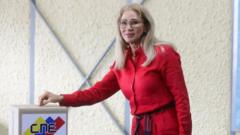Venezuela's ruling party, the United Socialist Party of Venezuela (PSUV), is celebrating what it calls an "overwhelming victory" in recent regional and parliamentary elections. However, this declared success follows a boycott by most opposition parties, which have labeled the elections a "farce". The National Electoral Council (CNE), which critics argue is biased, claims that the PSUV clinched victory in 23 out of 24 governor positions and 82.68% of the votes for the National Assembly.
Opposition figures, including María Corina Machado, rebut these claims, citing a turnout below 15%, contrasting the CNE's reported 42.6%. They accuse the government of repressive tactics, claiming their calls for a boycott reflected more than just voter apathy. Machado stated, "More than 85% of Venezuelans did not obey this regime," emphasizing the widespread discontent.
Controversy ensues as several opposition politicians, including Henrique Capriles and Manuel Rosales, opted to participate, a decision that provoked backlash from boycotting advocates who viewed it as a betrayal. Despite low voter turnout, PSUV enjoyed significant victories, while Capriles remarked that voting is a resilient act against the regime.
Amid rising tensions, there were arrests of over 70 individuals linked to opposition parties, accused of election sabotage, which Machado condemned as "state terrorism". Further complicating the elections, Venezuelan voters were asked to choose representatives for the Essequibo region, a territory claimed by both Venezuela and Guyana. However, the actual voting was symbolic as no polling stations were set up in the disputed region, leading to global scrutiny over the legitimacy of the process.


















